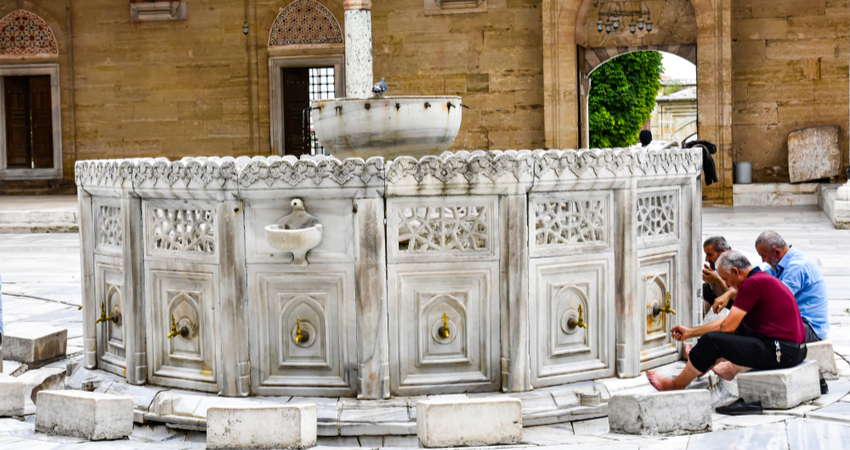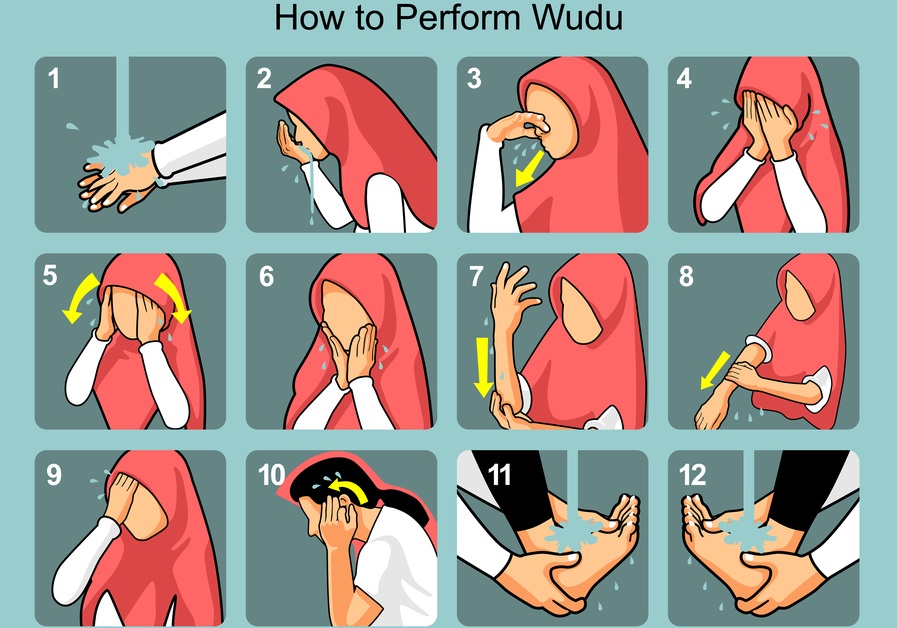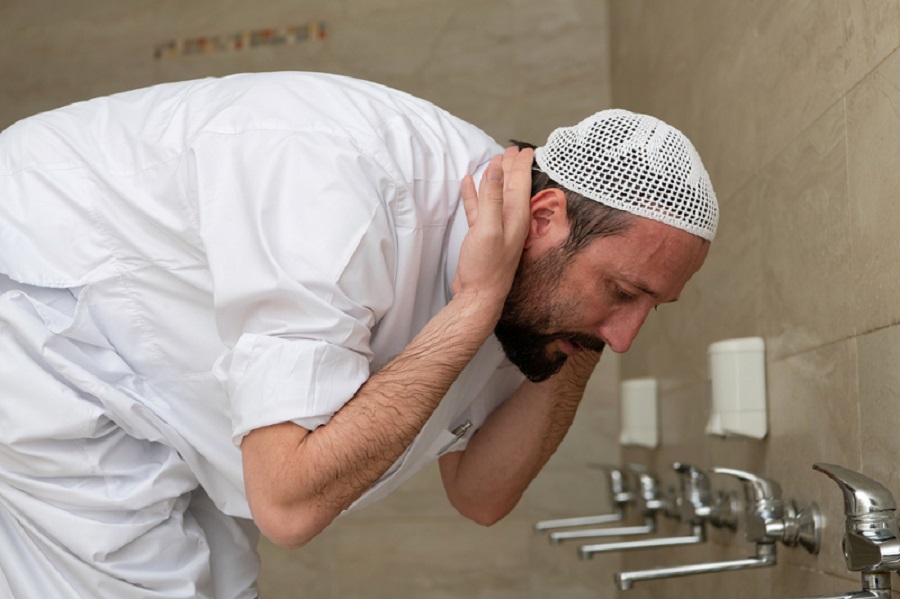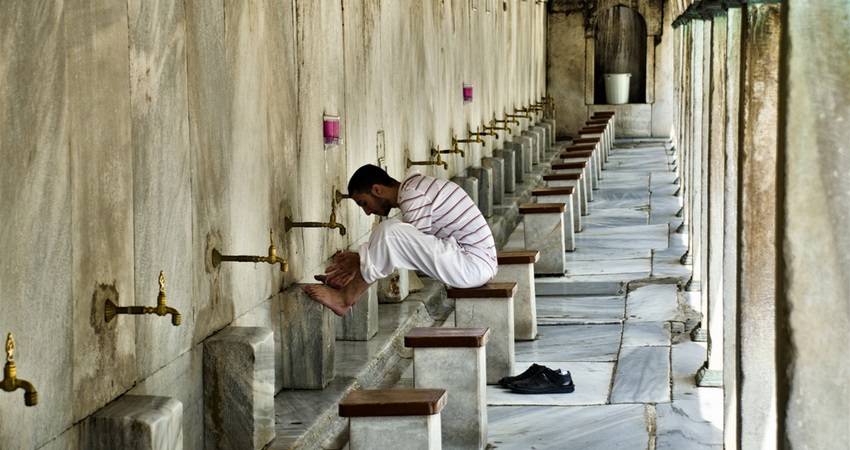It is obligatory to perform a full-body purification ritual, Ghusl, before prayers and after the menstrual period or sexual intercourse. In Umrah pilgrimage, the act of Ghusl plays an important role. It is an important part of preparing oneself to visit the house of God. How to perform purification bath in Islam lays out the right way to wash oneself before entering into the state of Ihram for Hajj or Umrah pilgrimage and also before starting with Eid and Jumma prayers.
Allah the Exalted says: “O Believers [faith]! If you are in a state of major impurity [that requires ritual bath], then purify yourselves.” (Al Maida, 6)
What is Wudu?
Before we go on to the right way of performing ghusl, let’s understand another important term. Wudu is an Islamic technique of cleansing one’s body parts. It is a type of ritual purification with 4 compulsory acts consisting of washing the face and both arms including the tips of the fingers and elbows, wiping the head and washing both the feet including ankles with water.
Wudu is a necessary part of ghusl for men and ghusl for females. It is performed during ghusl dua and is an act of partial ablution (washing). According to Ali al-Ridha, if even a drop of blood, urine or animal faeces falls into the water, the person must remove ten buckets of water from it before beginning with wudu. Activities like defecation, deep sleep, urination, flatulence, menstruation, light bleeding, sexual intercourse and postpartum can invalidate wudu.
How To Perform Purification Bath or Ghusl?
Before going for a purification bath—also known as Ghusl, one must recite Ghusl Dua or state his/her intention or Niyyah by saying, “I am performing Jannaba so as to become pure”. Even though not reciting Ghusl Dua or stating your intention will not have any effect on the ritual, you will earn no rewards for it and it is also recommended to not recite any Aayah or Kalimah during the ritual.
Rules of Ghusl
There are certain rules that a Muslim has to follow while performing Ghusl. One should perform Ghusl in a private place without facing towards the Qibla (the direction of Kaaba) and in a sitting or standing position. It is also said that one should use sufficient water and refrain from speaking whilst performing a ritual bath. He/she should wash both his/her hands and private parts thoroughly. When you are through with the bath, if there is a certain portion on the body left dry, then you don’t necessarily have to perform Ghusl again but just wash the portion accordingly. And, if you forget to wash your nostrils, mouth, ears and navel, then wash them as well.
Also, it is advised to take off all the accessories before beginning with the bath. This way no portion of the body will be left dry. The water sources that can be used for the purification act are well water, rainwater, the water of melted ice, spring, river or seawater and water from a pond or a big tank. It is prohibited to use impure or dirty water for the ritual.
How to perform purification bath – Step-by-step Guide
- State your intention (Niyyah)
- Say Bismillah
- Rinse your hands three times
- Wash your private parts and any other impure part of the body thoroughly.
- Perform Wudu (an Islamic practice of cleaning the body) as you do daily but don’t wash your feet yet.
- If you are bathing on a platform or a stool where the water is rapidly flowing, then you need to perform the Wudu completely. But, if it feels like your feet will get dipped in the water, then wash them after you are through with the bath.
- Wash your head thoroughly so that the water reaches the scalp. Men should clean their beards thoroughly too. Ghusl steps for ladies include thorough washing of hair, and if the hair is not in a plait, then it is important to wash it to the roots. Do not leave a single hair out otherwise, the Ghusl will be considered invalid. But, if a woman has her hair in a plait, then it is not necessary to open it, just wet the root of each hair.
- Starting from the right side, pour water on the whole body. Do the same at the left side and then the entire body. Do this three times each and make certain that no area is left dry and thoroughly rub your hands all over the body while washing.
- After the Ghusl, step away from the area and wash your right feet and then the left feet. But, if your feet have been washed during the process, then there is no need to wash them again.
- Dry your body with a clean towel and dress up.
How to do ghusl after period?
Ghusl Janabat for females refers to the full washing of the body after sexual intercourse and periods. There are two methods by which a female can perform Ghusl after menstruation. Here’s a guide on how to perform purification bath for women.
Method 1: Completing obligatory ghusl after period
- Remove all the cosmetics, clothes and jewellery from the body. There should be no barrier between the body and the water.
- Set your intention to purify in your heart or mind.
- Turn the shower on and step into it. Clean yourself as you daily do before beginning with Ghusl.
- Tilt your head back and rinse your mouth and nose.
- Let the water clean your entire body at least once. Turn your body left and right so that the water reaches all the parts. You can do this three times too as that is the required time for a complete ghusl.
- Make sure that the water has reached every part of your body. You can move your hair around so that your scalp is thoroughly wet.
- When you are done, dry yourself with a clean towel.
Method 2: Performing complete ghusl with Sunnah acts
- Start by stating your intention
- Remove all your clothing and jewellery and step into the shower.
- Say “Bismillah” and wash your hands thoroughly three times.
- With your left hand, wash your private parts. Rub or pat all body parts with water, particularly your private areas after menstruation.
- Use musk or perfume to rid yourself of any lingering odours.
- Pour water over your head three times, making sure that it reaches the scalp.
- Make use of your hands to clean the entire body.
- Once you’re done, dry yourself with a clean towel.
This completed the ritual of ghusl for female after period.
Must Read: Performing Umrah From Masjid e Aisha
Obligatory Acts Of Ghusl
- Wash your mouth till the water reaches the entire mouth.
- Wash your nostrils till the portion of the flesh.
- Wash your entire body, be it intentionally or unintentionally.
- Rub your hands thoroughly and wet the entire body.
Acts Prohibited without performing purification bath
There are certain devotional acts that a Muslim cannot perform without having the ritual bath first. They are as follows:
- Do not perform a ritual prayer or Ghusl Dua.
- Do not touch and read the Holy Quran or any of its verses.
- Do not perform tawaf around the House of the God, Holy Kaaba.
- Do not enter the mosque unless you are forced to do so in an emergency.
When to perform Ghusl?
Along with how to perform purification bath, one must be aware of when to perform Ghusl. Here are a few instances:
- When there is an impure stain on the body (Could be from a sexual act)
- After the menstruation cycle has ended
- When the after-birth bleeding has stopped
- After returning from a long journey
- After washing a deceased person’s body
- In times of extreme darkness, fear and storms
- To wear new clothes
- Upon recovering from unconsciousness or regretting a sin
- For gathering blessings
- Before Tawaaf for Umrah
- To stay in Muzdalifah and Arafat
- When visiting the Holy Prophet and for the three days when the Hajis throw stones at the devil
The right way of performing ghusl for both men and women must be followed as prescribed by Islamic scholars and it is the only way to attain complete and valid purification to perform the most sacred acts of religion.
Ghusl FAQs: How to perform purification bath
What is the meaning of Ghusl?
In Islam, Ghusl means a major ablution, which consists of bathing in ritually pure water.
Why does a Muslim perform Ghusl?
Ghusl is a way of maintaining purity and getting duas accepted. It is considered a quality of true nature and is a type of worship to Allah.
Can Ghusl be performed without water?
If an individual is suffering from scaling or moisture-induced skin or does not have clean water available, then he or she can purify himself/herself using purified dust or sand. This act of dry purification is called Tayammum.
Can Ghusl be performed in the shower?
Ghusl can only be performed when your body is completely submerged in the pure water after you have taken a shower. Scrub your clean body in pure water to get completely purified.
Can a couple perform the ritual bath together?
It is recommended to perform the ritual bath alone. As an individual is preparing himself/herself to worship Allah, it is a spiritual bath that he/she should be performed alone.











